问题
选择题
俗语说:“一个篱笆三个桩,一个好汉三个帮。”对此理解正确的是( )
A.个体只有依靠集体,才能有无穷的力量
B.个人的力量是微不足道的
C.集体需要个人为它作贡献
D.集体离不开个人
答案
答案:A
本题考查个人与集体的关系。一个好汉三个帮,一个篱笆三个桩 。一个坚强勇敢的好汉,需要有人帮助他才能把事情办成办好;一个篱笆墙,需要有几根木桩帮它夯实或支撑,篱笆才能立得结实牢固。它的含义是说一个人的力量再大也毕竟有限,必须有人帮助他才能取得成功。一个人的力量是有限的,众人拾柴火焰高。一个人的能力是很单薄的,但是有大家的帮忙就能办得更好。所以我们要团结一致。仅凭个人单枪匹马“闯天下”,并不能称为好汉,只有善于获取别人的帮助而能有所作为的人,才是真正的好汉。

